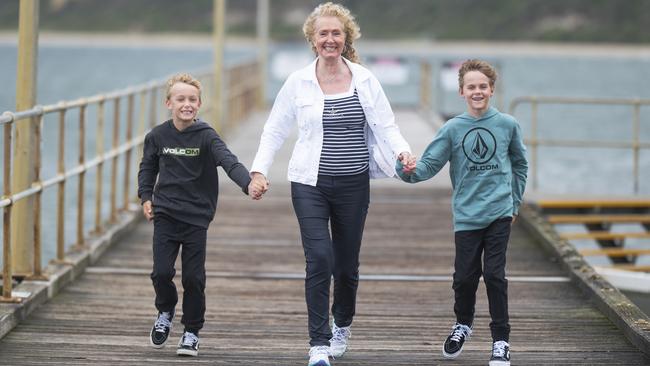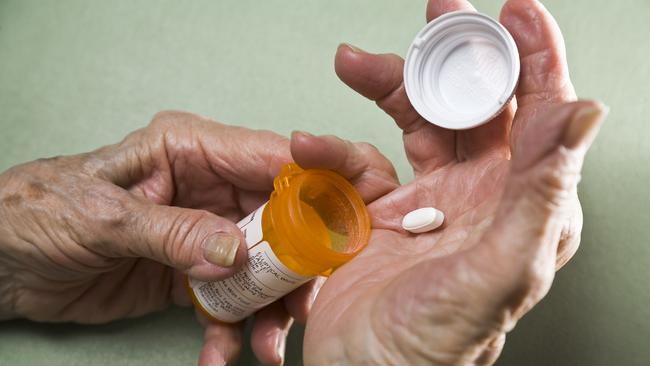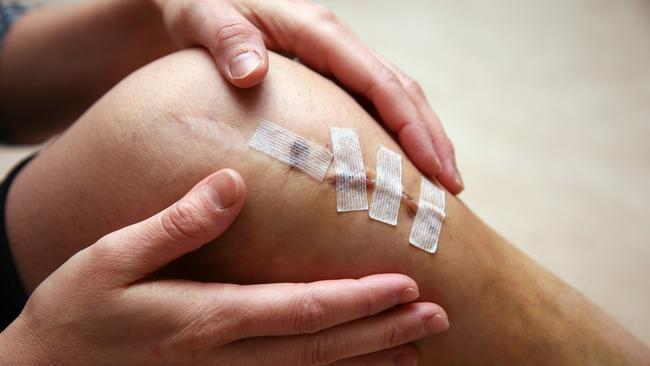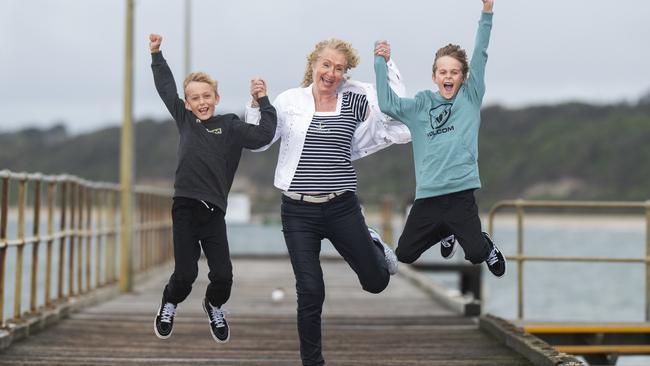Breakthrough arthritis treatments will be available in five years
Former AFL star Andrew Walker has revealed his struggle with osteoarthritis as four new treatments and two vaccines offer much-needed relief for four million Australians.

National
Don't miss out on the headlines from National. Followed categories will be added to My News.
Exclusive: Four potential blockbuster new treatments for arthritis and two vaccines that not only end the pain but stop its cause are likely to hit the market within the next five to 10 years.
Four million Australians are affected by the condition that causes pain, stiff and swollen joints, tiredness and deformity and as yet there is no cure.
The two main types are:
* Osteoarthritis, which is degenerative condition in which the cartilage surrounding the joints in hands, knees, hips, or spine breaks down so your bones rub together.
* Rheumatoid arthritis, in which the immune system attacks and breaks down the soft tissue in joints. It causes painful swelling and can lead to joint deformity and bone erosion, inflamed joints, stiffness, and fatigue.
Four in ten Australians are expected to develop osteoarthritis as they age and, by 2030, it is forecast to cost the health system $7.65 billion a year and the economy $27 billion a year.

University of Sydney rheumatologist and Arthritis Australia adviser Professor David Hunter said the standard management of the condition usually involves a prescription for an anti-inflammatory medicine and then joint replacement surgery.
“About 20 per cent of people are also told to take opioids which we know provide more harm in this condition than benefits,” he said.
Although evidence shows weight loss and exercise are the best ways of managing the condition this treatment is not reimbursed by the health system, Professor Hunter said.
“The Holy Grail of osteoarthritis treatment research is disease modification – altering both symptoms and the long term structural progress of the disease,” he said.

After years of being unable to offer his patients truly effective treatments he says the first disease-modifying therapies will be on the market in the next five to 10 years.
“It is a wonderful time to be both a clinician and a researcher in the space and there’s a there are a lot of changes going on in the way we deliver care,” he said.
NEW ARTHRITIS TREATMENTS
INVOSSA INJECTION
An injection called Invossa that combines a cell and a gene therapy to treat osteoarthritis of the knee and hip is in final stage clinical trials. Testing so far shows a single injection of the treatment provides pain relief and increased mobility for up to two years and it might be one of the first treatments to decrease the progression of osteoarthritis. It could also reduce the need for surgery to treat the condition. Clinical trials are due to be completed in June 2024.
LORECIVIVINT INJECTION
An injection called lorecivivint that reduces inflammation, slows cartilage breakdown and generates new cartilage in patients with osteoarthritis of the knee is being developed by US company Biosplice. In July last year it published clinical trial results showing people given the treatment were more than twice as likely than those given a dummy injection to have a 50 per cent improvement in pain or function at 12 weeks — and the improvement continued for at least six months.
SPRIFERMIN INJECTION
An injection of a new treatment called Sprifermin every six months has been found to increase the thickness of cartilage in people with osteoarthritis of the knee. The injection activates a protein that is important in keeping cartilage around the joints stable. The injection also prevented decline of cartilage and reduced pain from the condition by around 50 per cent.

PENTOSAN POLYSULPHATE
A medication called Pentosan Polysulfate Sodium — used for 70 years to treat blood clots and urinary tract infections in women — is being repurposed by Australian company Paradigm Biopharmaceuticals as an injectable osteoarthritis treatment. Patients get two injections a week for six weeks and small studies suggest it reduces pain by around 30 per cent for 12 to 18 months. The drug has been used for more than 20 years to treat osteoarthritis in dogs and horses. Former AFL players and NFL players in the US have had improvements in their injury-related osteoarthritis after using it.
Chief Medical Officer for Paradigm Biopharmaceuticals Dr Donna Skerrett said it had favourable effects on inflammation, pain, tissue preservation and also improved blood flow. Final stage clinical trials in Australia are taking recruits now. It could be on the market by 2025 at a cost of $2500 for a six week course of injections. Former doctor for AFL team Carlton Dr Phil Bloom, who is running clinical trials, said one patient had an allergic reaction similar to the blood clots caused by the AstraZeneca vaccine and one in 10,000 people may be affected but most of his patients received a 30 to 80 per cent improvement in their symptoms.
ANTI-INFLAMMATORY DEVICE
A new nerve treatment for rheumatoid arthritis invented by Melbourne University researchers at the Bionics Institute uses electricity to reboot the body’s built-in healing system. The battery powered device is inserted into the patient’s abdomen using keyhole surgery to stimulate the vagus nerve which controls the body’s anti-inflammatory reflex. A trial in knee patients found eight in 10 reported less pain, had more flexibility and some participants no longer needed to take medication or have knee surgery.

INJECTABLE MEDICINE
A final stage clinical trial of an injection for osteoarthritis of the knee is being undertaken in Australia. The Excellence study is testing a six monthly injectable treatment that early stage trials found could reduce pain by 30 per cent. MRI scans also showed patients treated with the drug had less cartilage loss than patients given a dummy injection.
STEM CELLS INJECTIONS
A clinical trial of a new stem cell therapy for osteoarthritis is recruiting patients in Australia. Sydney University’s Professor David Hunter who is involved in the The Sculptor trial said past trials used stem cells harvested from old people, the new trial will use stem cells from a younger donor in the hope they work better.
RHEUMATOID ARTHRITIS VACCINES
A vaccine against rheumatoid arthritis has been developed by University of Queensland Professor Ranjeny Thomas. In Rheumatoid Arthritis (RA) the body’s immune system mistakes joint tissue as foreign and attacks it. Prof. Thomas discovered that the immune system could be ‘re-educated’ so it did not attack healthy tissue. The drug DEN-181 has been used in early stage clinical trials at the Princess Alexandra Hospital in Brisbane. A US trial of another vaccine against rheumatoid arthritis caused it to completely disappear in animals. It uses a protein that protects against auto-immune diseases.
DRUG THAT GOT EX-CARLTON PLAYER ANDREW WALKER RUNNING AGAIN

Former Carlton player Andrew Walker was so crippled with arthritic pain he could barely walk off the field when he retired in 2016.
But he is back playing thanks to a new treatment.
“I really did put my body through hell to try and get up and play every week, but I literally had sort of you know, that really yuck sort of eight to 10 pain on a on a daily basis,” Walker said.
He was dealing with constant swelling of the knee that had to be drained and had undergone surgery twice in 10 years.
Walker played 202 games for Carlton and said the last 25 to 30 games were “a real struggle with osteoarthritis”.
He tried steroids, painkillers, anti-inflammatories, plasma rich protein injections an even stem cell therapy to stem the pain but nothing seemed to work.

Then, in 2016 along with around 50 other AFL players, he took part in a trial of a new treatment Pentosan Polysulphate Sodium (PPS).
Even before he finished the six week course of injections he noticed an improvement, his pain improved he regained a range of motion in his knee, allowing him to cancel the booking he had for partial knee replacement surgery.
Walker returned to his hometown of Echuca after retiring from Carlton and took up playing country football and after the treatment was able to run up to 30 kilometres a week.
“I’m still I’m very, very active, I still play a level of football, I still run or do some sort of exercise on a daily basis. So very, very fortunate,” he said.
Following his retirement, Walker was employed by Carlton as a Development & Integration coach, specialising in helping first year players in their transition to professional football.
He also signed up to play West Preston-Lakeside in the Northern Football League in 2017 and in 2018 headed back to his original junior club Echuca to take up the role as a playing coach.
Walker has three children sons Cody and Arli and a daughter Leti who, like their dad, love chasing a football with the family dog in tow.
Walker said its one of the reasons he moved back to Echuca Moama, and purchased some acreage.
He wants his children to experience the same carefree childhood he had.
The effect of the trial arthritis treatment lasted for almost six years and he is now finishing a second course.
“I was the biggest, biggest sceptic of all time with all sorts of drugs but I feel like I’ve had sort of two or three really good years of nearly pain free for the best part of that time,’ he said.
He is one of a group of AFL footballers who have helped finance the development of PPS as an arthritis treatment.
REAL ESTATE AGENT VIV COX FINALLY ABLE TO ENJOY RETIREMENT

VivFull List Cox’s arthritic knee kept her awake at night and she couldn’t wear jeans because of the pressure on the joint but a new treatment means she’s back at the gym.
The retired real estate agent was told she needed a knee replacement for her arthritis but wasn’t keen after seeing surgery wasn’t that successful for her mother.
“I thought if there is another alternative I want to try it,” she said.
A chance meeting with former AFL player Greg Williams meant she learned of a new drug Pentosan Polysulphate (PPS) that was being trialled in arthritis.
“When I got about the fourth or fifth injection, it was like magic. It was absolutely like magic,” she said.
The treatment not only resolved the problem with her knee, it got rid of the pain from arthritis from other parts of her body,
Ms Cox had tried acupuncture, Panadol and anti-inflammatories and nothing eased her pain before PPS.
After the treatment not only could she walk longer distances she was back at the gym and could do squats.
“It was like a miracle for me,” she said.
More Coverage
Originally published as Breakthrough arthritis treatments will be available in five years





